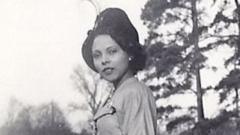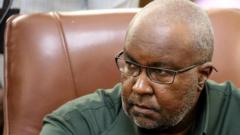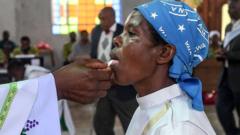**Unveiling the life of Andrée Blouin, a trailblazer in Africa's independence movements, whose narrative is being revived through a re-release of her autobiography.**
**Andrée Blouin: A Voiceless Heroine of African Independence**

**Andrée Blouin: A Voiceless Heroine of African Independence**
**Exploring the Untold Legacy of Andrée Blouin, Pan-African Activist and Prolific Advocate for Women's Rights**
Andrée Blouin was born to a French father and a Central African mother, a lineage that placed her at the intersection of colonial struggles and identity crises. Her daughter, screenwriter Eve Blouin, reflects on her mother’s revolutionary journey in the epilogue of “My Country, Africa: Autobiography of the Black Pasionaria,” recently re-released after years out of print. Andrée Blouin fervently dedicated her life to Africa's liberation during the 1950s and 60s, particularly mobilizing women's voices in the Democratic Republic of Congo against colonial power. She rose as a fierce adviser to Patrice Lumumba, the first Prime Minister of the Congo, and was involved with notable figures like Kwame Nkrumah and Ahmed Ben Bella, yet her significant contributions have often been overlooked.
The tragedy of losing her mixed-race son, René, to a lack of accessible medical care in the segregated colonial system ignited Blouin’s passion for decolonization. Her memoir details how this personal loss transformed her into a fierce advocate against the institutionalized racism that plagued Africa. Growing up amid colonial oppression in what were then French-controlled colonies, Andrée faced a tumultuous childhood in an orphanage, where children like her were discarded by society.
Blouin’s political journey began in Guinea amid its struggle for independence from France. Her relentless campaigning helped the nation achieve independence in 1958, a significant victory that led her to further influence leaders, including advising the Central African Republic's new president. Her passion for independence drove her, even as she grappled with family responsibilities.
In 1960, with encouragement from fellow activists, Blouin embarked on an impactful journey to the Democratic Republic of Congo, joining campaigns to advocate for both women's rights and national independence. Her distinct presence, punctuated by confident fashion choices and unyielding spirit, garnered attention and respect, but also unfounded criticism.
As she worked with the charismatic Lumumba, she became an essential part of the nascent government. However, her tenure was marred by turmoil as Belgium and Western nations interfered in Congolese politics, leading to Lumumba’s tragic assassination. This personal and collective loss plunged Blouin into despair, forcing her into exile and separating her from loved ones.
Despite these challenges, Blouin continued to contribute to pan-African discussions and movements, shedding light on the struggles of African leaders. Yet, as she watched her vision of a liberated Africa suffer, her idealism was challenged by reality, leading to a profound disillusionment with African leadership and governance.
Blouin's life ended in Paris in 1986, marked by a significant yet understated legacy. While her death did not attract widespread attention, her contributions resonate within cultural spaces, such as the Kinshasa center named in her honor.
“My Country, Africa” is a crucial key to understanding Andrée Blouin's resilience and dedication, highlighting the journey of a woman who transitioned from obscurity to become a beacon of hope for millions. The book’s re-release on January 7, underlines a growing recognition of women's roles in historical movements, promising to educate readers on the legacy of a truly remarkable heroine of African independence.


















